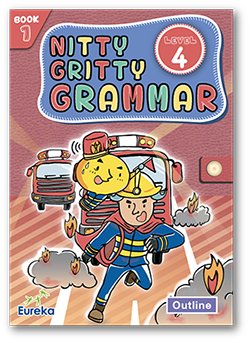All | Kindergarten Programmes | Primary School Programmes | Secondary School Programmes

Course Name: Nitty Gritty Grammar Level 4
Level: Primary 4
No. of Lessons: 15 (Suggested)
Lesson Duration: 1 hr or 1 hr 30 mins (Suggested)
Instructors: Native English teachers with a university degree ; related teaching experience, and/or teacher training such as TEFL, TESOL, CELTA, PGDE/PCEd, etc.
Leaflet: English version* / Chinese version
*Contact us via email at [email protected] or WhatsApp at 9846 7453 to obtain the password for the leaflet. Include your name, organization, and contact number in the message.
Objectives
Nitty Gritty Grammar is a comprehensive and engaging programme to help students become confident in using English. It is a fully integrated grammar reference and practice book to help students understand grammatical terms and usage which can be applied to everyday life. Little nuggets of information and facts are also provided throughout the different levels to keep students engaged and hopefully encourage them to learn more about a topic.
Features
- Topic-based curriculum covering all essential grammatical areas of the English primary school curriculum. It also aligns with the Cambridge Young Learners grammar framework (Starters, Flyers, Movers).
- Comprehensive notes on grammatical usage and exceptions
- Clearly defined learning objectives included in each unit
- Animated illustrations and to aid comprehension
- A wide variety of exercises to test students understanding, including cloze summary and proofreading
- Handy grammar notes to recap the essential grammatical structures
Outline
Unit 1: Countable and Uncountable Nouns
-
- Countable and uncountable nouns
- Quantities (a … of)
- Determiners (a few / a little / a lot of)
Unit 2: ‘ing’ forms and to-infinitives
-
- ‘ing’ forms
- ‘ing’ forms + objects
- To-infinitives
Unit 3: Comparative and Superlative Adjectives
-
- Short adjectives (-er / -est)
- Long adjectives (more / most)
- Irregular adjectives (good / better / best / bad / worse / worst)
- As … as
Unit 4: Other Comparative and Superlative Forms
-
- Comparing nouns (more/most/less/least/fewer/fewest)
- Comparative and superlative adverbs
Unit 5: Prepositions
-
- Place (beside, next to, behind, in front of, between, on, under, in, above, below, opposite, near)
- Movement (up, down, into, out of, off, on to, towards, past, along, through, around)
Unit 6: Conjunctions
-
- And/but/or
- Because/when
Unit 7: Adverbs
-
- Too
- Either
- Also
Unit 8: Simple Present Tense
-
- Verb forms
- Questions (Do / Does…?) and negatives (do / does not)
Unit 9: Simple Past Tense
-
- Regular verbs
- Irregular verbs
- Questions (Was / Were / Did…?) and negatives (was / were / did not)
Unit 10: Talking about the Future
-
- Future tense (will)
- Question (Will…?) and negative (will not)
- be + going to
Unit 11: Modals
-
- Ought to
- Ought not to
Unit 12: Wh- and How questions
-
- What / When / Why / Which
- How
Unit 13: Adverbs of Frequency
-
- always / usually / often / sometimes / seldom / rarely / never
- How often…? once / twice / three times
Unit 14: Pronouns
-
- Reflexive pronouns
- Possessive pronouns
- Indefinite pronouns (something / everything / nothing / anything)
- Indefinite pronouns (somebody / everybody / nobody / anybody)
Unit 15: Relative Clauses
-
- who
- which
- where
